Hey, everybody, this is Saif, from easetent.com, today I want to tell you how you maintain your RV generator and How Often Should an RV Generator Be Serviced? An RV generator is one of the most useful appliances if you are going for an outdoor adventure or you’re traveling on the road and you want electricity so you can do everything whether it is charging the batteries or using a coffee pot or whatever, it is a great thing to have for enhancing the experience of your trip.
But as we all know every good thing has a bad side and the same thing complies with the generator (generators are very expensive). I believe if we bought a generator separately it probably cost three or four thousand dollars (depending on your state market rates and time), so as something is pretty expensive it is necessary to maintain it periodically to keep your generator happy.
I’m going to give you some tips and answer the most common queries related to RV generator repairs.
Table of Contents
Why is it important to do regular maintenance of RV generators?
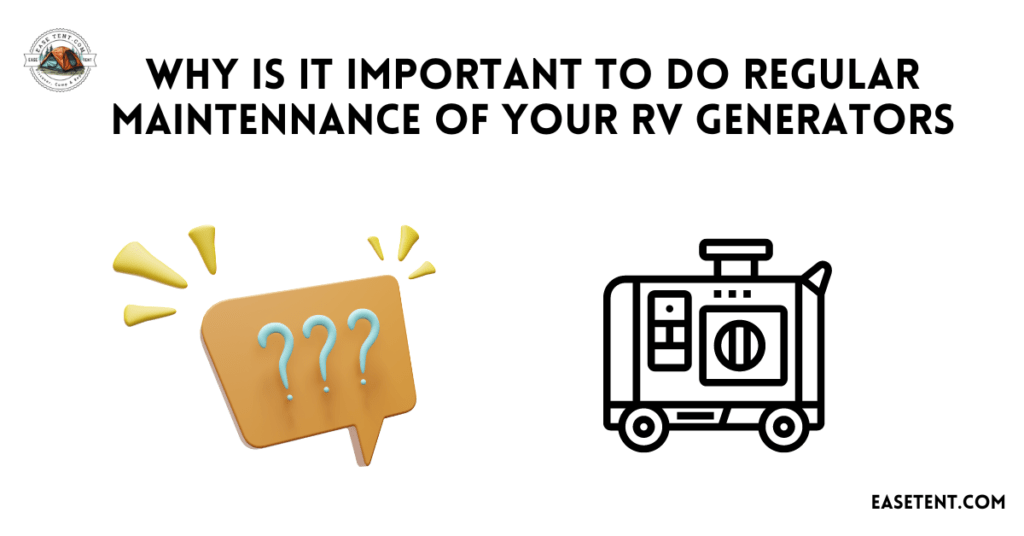
Taking care of your RV generator isn’t just about keeping it running; it’s about ensuring your adventures go smoothly without any unexpected interruptions. Let me share a few reasons why regular maintenance of your RV generator is so crucial.
Regular maintenance of your camper generator ensures reliability, so you’re not left without power in remote areas. It improves efficiency, saving fuel and reducing emissions, which is good for your wallet and the environment. Proper upkeep extends the lifespan of your generator, protecting your investment. Lastly, it ensures safety by preventing dangerous issues like fuel leaks or electrical problems. Regular check-ups keep your travels smooth and worry-free.
First off, think about reliability. When you’re out on a trip, especially in isolated areas, you rely heavily on your generator for electricity. Whether it’s for keeping your food chilled, running your AC, or simply charging your devices, a well-maintained generator ensures you won’t be left in the dark (literally!).
Then, there’s efficiency. A generator that’s regularly serviced will run more efficiently. This means it uses fuel more effectively, which can save you money in the long run. Plus, it reduces radiation, which is better for the environment. So, you’re not only doing your wallet a favor but also being a bit kinder to our planet.
Another biggie is longevity. Just like any other machine, your generator will last longer if you take good care of it. Regular maintenance, like changing the oil, checking the filters, and inspecting the spark plugs, helps keep all the components in good shape. This way, you can extend the life of your generator and get the most out of your investment.
Lastly, safety is a significant concern. Generators that aren’t properly maintained can develop dangerous issues like fuel leaks or electrical problems, which could pose serious risks.
In short, regular maintenance of your RV generator is a small effort that pays off in big ways. It keeps your travels smooth, and your generator running efficiently, and ensures you get the most out of your adventures without unnecessary interruptions. So, next time you’re planning your trip, don’t forget to give your generator some love – it’s worth it!
What are the maintenance standards for a generator?
Maintenance standards for a generator generally include regular oil changes, generally after every 100-150 hours of use or recommended by the company. Air filters should be checked and replaced as needed, typically every 200-300 hours. Spark plugs need inspection and replacement around every 500 hours. Fuel systems should be cleaned and inspected regularly to prevent clogs. Battery connections must be checked to ensure they are clean and secure. Additionally, cooling systems should be inspected, ensuring radiators, hoses, and coolant levels are in good condition. Following these standards helps keep your generator running smoothly and efficiently.
How do you know that your Generator needs Service?
Identifying when your recreational vehicle generator needs service is key to preventing bigger issues down the road. Over the years, I’ve picked up on a few indicative signs that point out it’s time to give the generator some attention. Here are the main ones you should keep an eye on:
Unusual Noises or Vibrations
Unusual noises or vibrations in your RV generator, like knocking, clanking, or grinding, often signal internal issues such as loose or damaged parts. Addressing these sounds promptly can prevent more serious damage and ensure your generator runs smoothly.
Difficulty in Starting or Inconsistent Performance
If your trailer generator has trouble starting or runs inconsistently, it might indicate issues like worn-out spark plugs, a clogged fuel filter, or battery problems, if your generator is behaving like this it means it will require tuning.
Excessive Smoke or Unusual exhaust color
Excessive smoke or unusual colors in the exhaust from your RV generator—such as black, blue, or white—can signal issues like fuel system problems, engine overheating, or burning oil. These symptoms should be investigated promptly to prevent further damage and ensure efficient operation of your generator.
Increased Fuel Consumption
An increase in fuel consumption by your RV generator could indicate underlying issues such as clogged air filters, fuel leaks, or inefficient combustion. Monitoring fuel usage regularly helps identify these problems early, allowing for timely maintenance to improve fuel efficiency and prevent potential damage to the generator.
Overheating or Frequent shutdowns
Overheating or frequent shutdowns of your motor caravan generator can be symbols of many issues, including coolant leaks, clogged air filters, or problems with the cooling system. To prevent engine damage you have to address these problems as soon as possible.
Alarming smells (e.g., Burning or Fuel odors)
Detecting alarming smells like burning or fuel odors coming from your mobile home generator is crucial. These odors may indicate serious issues such as overheating of generator components, electrical problems, or fuel leaks.
In my experience, staying attentive to these signs can help you catch issues early and avoid more significant problems down the road. Regularly checking and maintaining your generator, even when it seems to be running fine, is always a good practice. Trust me, a little proactive care goes a long way in keeping your adventures powered up and trouble-free.
How do you Maintain your RV Generator? (Basic Steps)
Maintaining your caravan generator doesn’t have to be complicated. I will give you some straightforward steps so you can keep it running smoothly:
Regular oil changes: frequency and steps
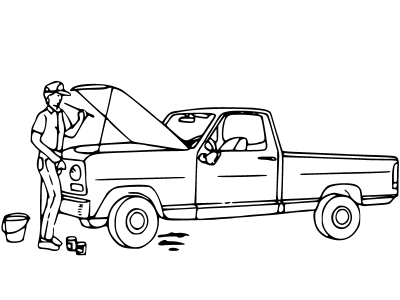
Regular oil changes are essential for maintaining the health of your RV generator, particularly if you are going to be boondocking and you know you’re going to get a lot of use out of your generator soon.
Check the oil level and its visual appearance, make it good. On the opening of the fuel tank, there’s a short little dipstick.
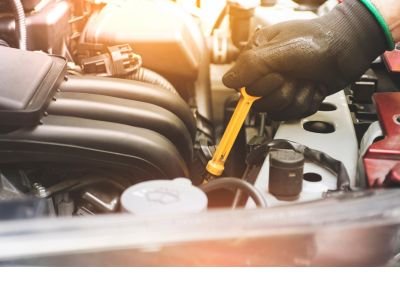
First, you have to pull it out and clean it off with a clean cloth or any paper and then put it back in the tank again you have to take it back out and then read your oil levels.
Also, make sure to follow the manufacturer’s guidelines for frequency, typically every 50-100 hours of use or annually. To change the oil, let the generator cool, drain the old oil, replace the oil filter if applicable, and refill with the recommended oil type and quantity. This simple step helps ensure the optimal performance and longevity of your generator.
How long can a Generator run before Adding oil?
The duration a generator can run before needing additional oil depends on its size, design, and operating conditions. Generally, smaller portable generators might require oil checks every 8 to 24 hours of continuous operation. Larger standby generators may go longer, needing oil checks every 100 hours or more. It’s crucial to consult the generator’s manual for specific guidelines on oil maintenance intervals to ensure optimal performance and longevity.
Fuel system Maintenance: Cleaning and Replacing fuel lines and Filters

Cleaning and replacing the oil filters is the most difficult part of the oil-changing process.
First of all, you have to take the filters out and be careful because during this process there may be some drops of hot oil.
After pulling back the old filters you want to take your new filter and you want to get some oil, it’s best to use the new oil and this is just for the seal and for lubing the filter.
After gently rubbing the new filter O-ring side put it back in the filter space.
Checking and Replacing Air Filters
Checking and replacing air filters is an important part of maintaining your generator’s performance. Regular inspection ensures that the air intake remains clean, allowing the engine to operate efficiently. Depending on your generator model, air filters should be checked periodically, typically every few months or as recommended by the manufacturer. If the filter is dirty or clogged, it should be cleaned with compressed air or replaced with a new one to prevent dust and debris from entering the engine, which can affect performance and longevity. This simple maintenance task helps ensure your generator runs smoothly and reliably when you need it most.
Spark Plug Inspection and Replacement
Inspecting and replacing spark plugs is essential for maintaining the performance of your generator. Periodically check the condition of the spark plugs according to the manufacturer’s recommendations, usually annually or after a certain number of hours of operation. To inspect them, disconnect the spark plug wire, remove the spark plug, and examine its condition. Look for signs of wear, such as erosion or carbon buildup. If the spark plug shows signs of wear or damage, replace it with a new one that matches the manufacturer’s specifications for gap and heat range. This routine maintenance ensures proper ignition, efficient combustion, and reliable operation of your generator.
Battery Maintenance: Ensuring Proper charge and Connections
Battery maintenance is crucial for ensuring your generator starts reliably when needed. Here are the key steps to keep your generator’s battery in top condition:
- Checking Charge
- Regularly monitor the battery charge level, especially before trips or periods of non-use. Ensure the battery maintains sufficient charge to start the generator.
- Inspecting Connections
- Clean battery terminals and cable connections to remove corrosion and ensure good electrical contact. Use a wire brush or battery cleaner solution for this task.
- Testing
- Periodically test the battery to confirm it holds a charge and functions correctly. If the battery struggles to hold a charge or shows signs of deterioration, consider replacing it.
- Charging
- If the generator is not in use for extended periods, keep the battery charged either by running the generator periodically or using a trickle charger to maintain optimal charge levels.
By maintaining the battery properly, you ensure the reliable starting of your generator, which is crucial for powering your RV appliances and electronics during your travels.
Cooling system checks: Radiator, hoses, and coolant levels
Checking the cooling system of your generator ensures it runs efficiently and prevents overheating. Here are the steps to perform cooling system checks:
- Radiator Inspection
- Regularly inspect the radiator for any signs of damage, such as leaks or corrosion. Clean the radiator fins if they are clogged with dirt or debris to ensure proper airflow.
- Hose Inspection
- Check the radiator hoses and other coolant hoses for cracks, leaks, or wear. Replace any damaged hoses to prevent coolant leaks that can lead to engine overheating.
- Coolant Level
- Check the coolant level in the radiator or coolant reservoir according to the manufacturer’s recommendations. Ensure the coolant is at the proper level and top up if necessary with the recommended coolant type.
- Cooling System Flush
- Periodically flush the cooling system and replace the coolant as recommended by the manufacturer to prevent corrosion and maintain cooling efficiency.
By performing these cooling system checks regularly, you ensure your generator operates at optimal temperatures, maximizing its performance and lifespan. Proper cooling system maintenance is essential for reliable operation, especially during hot weather or heavy use.
Do I Need to Do Anything Else to Maintain My RV Generator?
You can also enhance your generator’s effectiveness and life by practicing some additional practices that are beyond the basics. These include:
Regular Exercise
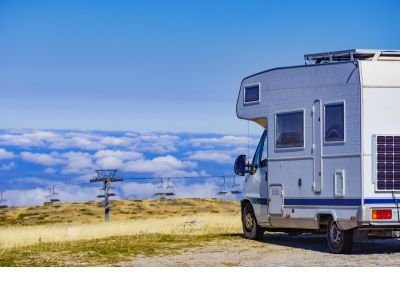
Even if you’re not using your RV frequently, make sure to exercise your generator by exercise I mean run your generator at least once a month.
If you are a camper or a trailer owner, you might find yourself wondering “How often should I run my RV generator?” Let’s take a closer look at this common query.
Monthly Exercise
Run your generator for about 40 to 50 minutes every month. This helps keep the internal parts lubricated and ensures the fuel system remains clean. Regular exercise prevents carburetor gumming and fuel deterioration, which can cause starting problems.
Under Load
When you run the generator, make sure it operates under at least 50% load. This means turning on appliances like the air conditioner, microwave, or other high-wattage devices. Running under load helps prevent carbon buildup in the engine and exhaust system.
During Off-Season
If you’re storing your RV for the winter or not using it for several months, it’s still crucial to run the generator monthly. Long periods of inactivity can lead to fuel-related issues and battery drain.
How I will warm up my Generator (How Do I Test My RV Generator?)
What I do is I start up the generator and run it for 5 minutes, once it’s been running for 5 minutes I just turn on the air conditioner and leave it turned on for 45 to 50 minutes.
After running the generator with the air conditioner on for 45 minutes to an hour then I will turn off the air conditioner and let the generator run for an additional 5 minutes just to make it cool down.
This is something that you need to do whether you’re plugged in an RV park or if your RV is sitting on a storage lot. Hence you need to turn on your generator and put it under load.
Exhaust System Check
Inspect the exhaust system for leaks, damage, or blockages. Ensure the exhaust pipe is clear and properly vented to prevent dangerous carbon monoxide buildup.
Fuel Quality
I suggest you always use fresh, high-quality fuel for your RV generator because fuel always plays an important in decreasing or increasing the effectiveness of the generator. If the generator uses gasoline, add a fuel stabilizer to the tank to prevent fuel degradation, especially if the generator will be stored for extended periods.
Professional Servicing
Schedule professional servicing at recommended intervals or if you notice any performance issues that you’re not comfortable addressing yourself. Professionals can perform more thorough inspections and maintenance tasks.
When to seek professional help
Generally, I will seek professional help when my RV generator exhibits persistent issues that basic maintenance can’t resolve, such as unusual noises, difficulty starting, or inconsistent power output. Additionally, if I notice leaks, excessive smoke, or warning lights, I turn to a professional to diagnose and fix the problem. Regular professional servicing is also important if the generator is nearing high hours or if I’m preparing for a long trip to ensure everything is in top condition.
Manual and Logs
Keep the generator’s manual handy and refer to it for specific maintenance guidelines. Maintain a log of all maintenance activities, including dates and what was done, to keep track of the generator’s service history.
What is considered high hours on a generator?
When it comes to generator usage, the term “high hours” can vary depending on the type and quality of the generator. Here’s a general breakdown:
Portable Generators
For portable generators, anything over 1,000 to 2,000 hours is typically considered high. These generators are designed for intermittent use and may start showing signs of wear and require more frequent maintenance as they accumulate hours.
RV Generators
For RV generators, “high hours” generally indicate significant use and potential for increased maintenance needs. Here’s a breakdown to help you understand:
Average Use
Most RV generators are designed for occasional use, such as during camping trips or road travels. On average, 500 to 1,000 hours is typical for many RV generators.
High Hours
An RV generator with over 1,000 hours is often considered to have high hours. At this point, the generator may require more frequent maintenance and inspections to ensure it continues running smoothly.
Longevity
Well-maintained RV generators can often exceed 2,000 hours or more. Regular oil changes, air filter replacements, and timely servicing can significantly extend the life of your generator.
How many hours does a motorhome generator last?
The lifespan of a motorhome generator can vary significantly based on its make, model, and how well it is maintained. Here’s a general overview:
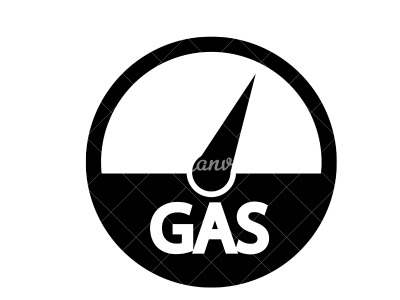
Average Lifespan
Most motorhome generators are designed to last between 1,500 to 3,000 hours. This range is typical for units that receive regular use and maintenance.
High-Quality Generators
Higher-end generators, particularly those from reputable brands, can last up to 5,000 hours or more with proper care. These generators are built to withstand more extensive use and often come with better durability features.
Maintenance Factor
The key to maximizing the lifespan of your motorhome generator is regular maintenance. Routine oil changes, air filter replacements, spark plug inspections, and keeping the fuel system clean are crucial. Generators that are well-maintained can often exceed the average lifespan and remain reliable for many more hours.
Usage Patterns
Generators that are used frequently but maintained well may last longer than those that sit unused for extended periods. Regularly running the generator, even during off-seasons, helps keep its components in good working condition.
In summary, with proper care and regular maintenance, a motorhome generator can last anywhere from 1,500 to 5,000 hours or more, providing reliable power for all your RV adventures.
FAQs
How do you know if you put too much oil in your generator?
If you put too much oil in your generator, you may notice excessive smoke, oil leaks, or a rough-running engine. Overfilling can also cause oil to reach the air filter and spark plugs, leading to performance issues. To prevent damage, check the oil level with the dipstick and drain any excess if necessary.
How often do you change the oil in a motorhome generator?
In a motorhome generator, it’s generally recommended to change the oil at regular intervals to maintain its performance and longevity. The frequency of oil changes can vary depending on the manufacturer’s guidelines, but typically it’s advised to change the oil every 50 to 100 hours of operation or annually, whichever comes first. Following these recommendations helps ensure that the generator operates smoothly and efficiently during your travels.
Conclusion
In conclusion, maintaining your RV generator is essential for ensuring it operates reliably and efficiently throughout your travels. By following regular maintenance routines such as oil changes, air filter checks, and running the generator periodically, you can extend its lifespan and prevent unexpected breakdowns. Knowing when to seek professional help for more complex issues ensures your generator remains in peak condition, ready to provide power wherever your adventures take you. Remember, a well-maintained generator not only enhances your camping experience but also offers peace of mind on the road.

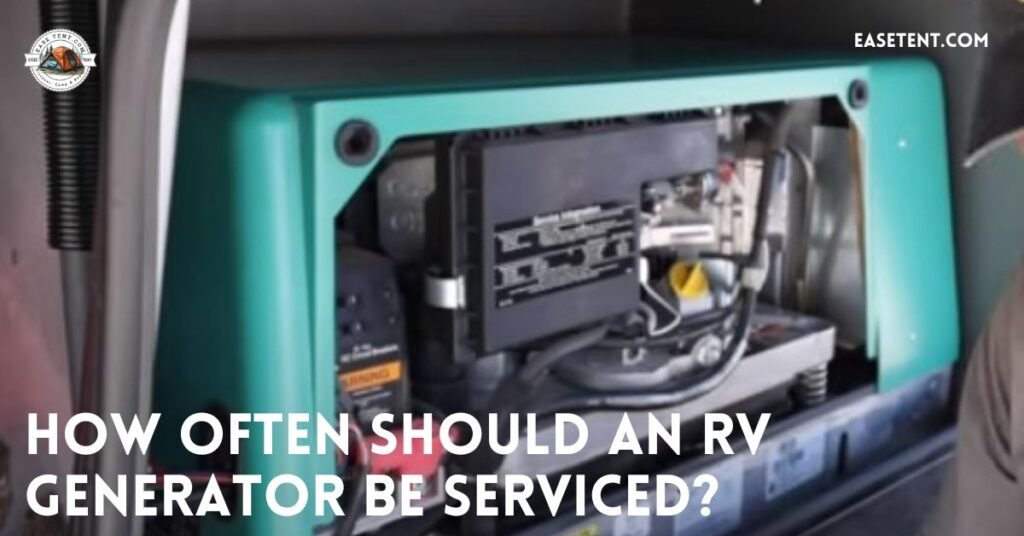
Pingback: Do I need to Unplug my RV before Starting the Generator?
Pingback: RV Road Rules: What’s Safe and What's Not in a Moving Van?